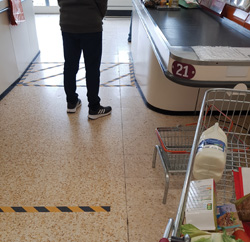The demand for tracking of people to allow ‘back to work’ despite Covid-19 is only part of a longer term trend of surveillance tracking, at work.
A webinar of people from backgrounds not usually in Professional Security today debated tracking of employee locations. First was Andrew Pakes, director of communications and research at the trade union Prospect, called for a worker representative to be in the room, to be part of conversations about tech that affects them. As he began by saying, Covid-19 has accelerated digital monitoring and data gathering. New technology that can monitor workers can improve lives; indeed, he was speaking from his kitchen. Tech can ensure safety in power stations and mines.
However, he raised the need for trust if tracking devices are to be adopted; and called for a ‘conversation’ involving employees and their unions around collective data rights, besides the rights of the individual. He quoted article 88 of the GDPR (Europe-wide general data protection regulation), about fundamental rights of workers; and the data protection impact assessment (DPIA) under article 35, that asks for consultation with the data subjects, and their reps. If you haven’t involved the unions before tech is used, you haven’t done a DPIA, ‘and increasingly that’s going to be a contestable issue’, he said.
Also speaking were Dr Anna Basiri, lectured in spatial data science at the Centre for Advanced Spatial Analysis (CASA) at University College London; Leo Scott Smith, the founder of tech firm Tended, who as a result of Covid-19 has been working on watches to vibrate to offer social distancing alerts; and the sociologist Prof Gina Neff, of the Oxford Internet Institute.
More in the July 2020 print edition of Professional Security magazine.
This was the third and final panel event in the Benchmark Initiative lecture series, about the ethics that underpin the responsible use of geospatial and geo-enabled data; about privacy, transparency, and how the new value from location data should be shared. Next comes the launch of a charter to set ethical guidelines for the collection and use of such data. The first panel, chaired by data ethics specialist and mathematician Dr Hannah Fry on location data and tracking epidemics, can be viewed on Vimeo. See also a blog on smart cities prior to the pandemic, what changes we are starting to see emerge now and what we might expect.










